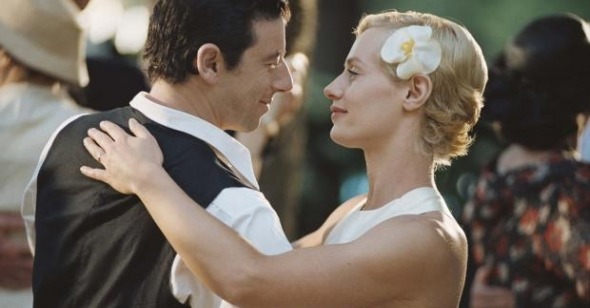Vacancy
by Sarah Silver
A Secret
Dir. Claude Miller, France, Strand Releasing
A Secret comes fully equipped with the essential elements of Foreign-with-a-capital-F art-house: based on a novel inspired by true events, it features Holocaust-related subject matter, a Zbigniew Preisner score, and the requisite Mathieu Amalric appearance. Stately and autumnal, like The Garden of the Finzi-Continis (to which it has been likened), and with elegant cinematography comparable to that of recent French literary adaptations Lady Chatterley and La Femme de Gilles, A Secret is respectable, if de rigueur.
Narrated by François Grimbert (a stand-in for author Philippe Grimbert), the film jumps back and forth between past and present, with the aughts appearing in black-and-white, and the years surrounding WWII in color. This seems appropriate, as there is little that’s memorable about the obligatory (included, no doubt, out of fidelity to the book) frame story, apart from several shots of Amalric staring pensively out of train windows. All interest here lies in the past, in François’s honey-glazed memories of his parents—stocky amateur gymnast Maxime (Patrick Bruel) and breathtaking former swimming champion Tania (Cecile de France), at the gym and the public pool, their respective homes away from home.
Although blond-haired, blue-eyed Tania is Jewish, the glorification of her toned biceps and flawless waistline as she dives into a placid azure pool seems to unmistakably reference the Aryan Olympic divers in Riefenstahl’s Olympia. Not only do Maxime and Tania place a great deal of emphasis on physical prowess; they are also the most willing in their circle of family and friends to hide their Judaism in order to get ahead. Tania fails to mention her religion when applying for a well-paid modeling job and Maxime expresses on more than one occasion his failure to comprehend the relevance of one’s religion in the public sphere.
Soon enough this narrative makes way for another, communicated via local massage therapist, world-weary lesbian, and longtime friend of the family Louise (a charmingly brusque Julie Depardieu). During François’s massage therapy sessions (he suffers from some unspecified ailment and is scrawny next to his brawny parents) he learns of Hannah, Maxime’s first wife, and Simon, his first son and François’s half-brother. In flashbacks, several loaded glances and one friendly gesture at the pool are enough to convince Hannah (Ludivine Sagnier, pale and stripped of her usual vivacity) that Maxime is deeply in love with Tania. Hannah’s rigidity, her refusal to accept any hint of faltering fidelity, even a stray thought, is difficult to swallow. Apparently, for Hannah, sinful thoughts equate sinful actions, and, stunned by jealousy and rage, she eventually has her twisted revenge en route to a safe hideout, when she defiantly shows her Jewish ID to the Gestapo, leading to her and her son’s deaths in a concentration camp.
Hannah’s stringency comes off as preposterous; would anyone really effectively commit both suicide and filicide in order to punish a husband she suspected of having unclean thoughts? Perhaps Hannah’s decision to give herself, and her son, over to the Nazis is meant as proof of her purity; she has no tolerance for an impure thought in her husband’s mind, and likewise no tolerance for lying about her religion, even when the known consequence of that truth is death. But her extremity makes her character appear so irrational as to be mentally deranged.
Since the film makes no attempt to explore Hannah as potentially mentally ill, but rather leaves her action alone, without passing judgment, it leads one to believe the filmmakers are exonerating her as noble. The fact that François is born with health problems and grows up puny seems like karmic punishment for Maxime, who looks at the underweight newborn with disappointment. As expertly photographed and acted as it may be, A Secret is troubling in a way perhaps not intentioned by director Claude Miller. It’s hollow and disingenuous that amidst fear and paranoia, genocide and war, regarding Hannah’s decision, all emphasis is placed on an emotion as trite as jealousy.
